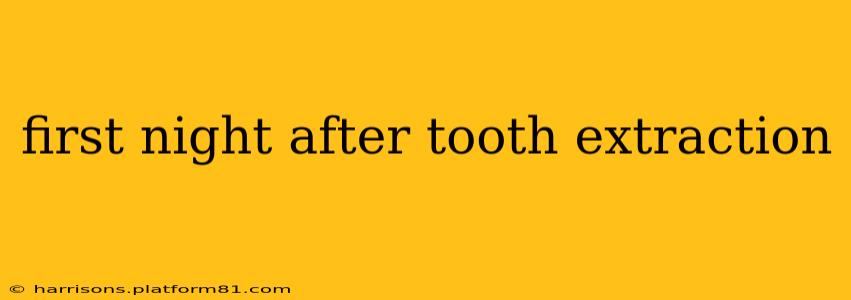Having a tooth extracted can be a significant event, and the first night afterward is often the most challenging. This guide will walk you through what to anticipate, how to manage pain and swelling, and when to seek professional help. We'll also address some common questions people have about post-extraction recovery.
What Should I Expect the First Night After a Tooth Extraction?
The first night after a tooth extraction will likely involve some level of discomfort. Expect some bleeding, swelling, and pain. The degree of each varies depending on the complexity of the extraction. Simple extractions usually result in less discomfort than impacted wisdom tooth removals, for example. You'll likely feel some throbbing or pressure in the extraction site. It's also common to experience some bruising and numbness in the area surrounding the extraction.
How Much Pain Will I Experience After Tooth Extraction?
Pain levels vary greatly between individuals and the type of extraction performed. Most people report moderate pain that can be effectively managed with over-the-counter pain relievers like ibuprofen or acetaminophen as recommended by your dentist or oral surgeon. Some may experience more significant pain, requiring stronger prescription medication provided by their dentist. Following your dentist's post-operative instructions meticulously is crucial for optimal pain management.
What Can I Do to Reduce Swelling After a Tooth Extraction?
Swelling is a normal part of the healing process. To minimize swelling, apply a cold compress (ice wrapped in a thin cloth) to the affected area for 15-20 minutes at a time, several times a day, especially during the first 24 hours. Elevating your head with an extra pillow while sleeping can also help reduce swelling. Avoid strenuous activities that increase blood flow to the area.
What Are the Best Ways to Manage Bleeding After a Tooth Extraction?
Minor bleeding is expected immediately following the extraction. Gently bite down on a gauze pad placed over the extraction site as instructed by your dentist to help control bleeding. Replace the gauze as needed. If bleeding persists or is excessive, contact your dentist immediately. Avoid spitting or rinsing vigorously, as this can dislodge the blood clot that forms and initiate further bleeding.
What Should I Eat and Drink After Tooth Extraction?
Initially, stick to a liquid or soft food diet. Avoid hot liquids, as these can dislodge the blood clot. Think soups, smoothies, yogurt, applesauce, and mashed potatoes. As your healing progresses, you can gradually reintroduce solid foods. Always chew on the opposite side of the extraction. Avoid using a straw for at least 24 hours, as suction can disrupt the healing process. Staying adequately hydrated is essential, so sip water frequently.
Can I Smoke or Drink Alcohol After Tooth Extraction?
Both smoking and alcohol consumption should be avoided, especially in the immediate post-operative period. Smoking interferes with healing and increases the risk of infection. Alcohol can thin the blood, potentially increasing bleeding and slowing healing. It’s best to abstain from both for at least a week, if not longer.
When Should I Call My Dentist or Oral Surgeon?
Contact your dentist or oral surgeon immediately if you experience:
- Excessive bleeding that doesn't stop after several hours of consistent pressure.
- Severe pain that isn't adequately controlled with prescribed or over-the-counter medication.
- Signs of infection, such as increased swelling, redness, pus, or fever.
- Dry socket, characterized by intense pain several days after the extraction.
- Numbness that lasts longer than expected.
Following your dentist's post-operative instructions carefully and being vigilant for any warning signs is vital for a smooth and uneventful recovery. Remember, every patient's experience is unique. This information provides general guidance; always follow your dentist's specific instructions.
